Since their independance the Baltic states have been the most vociferous critics of Russia's foreign policy. Russia, in turn, still looks at the former Soviet republics with resentment. But frustrated maximalism from both sides must give way to a new language of rapprochement, argues the Estonian political analyst Kadri Liik on Carnegie Moscow. Today’s challenge for the Baltic states is to transform their moralist position into a policy that could work. One day Russia might also look at the Baltic states as just neighbors: not as an amputated part of the Soviet Union, or Washington’s hostile lapdog.
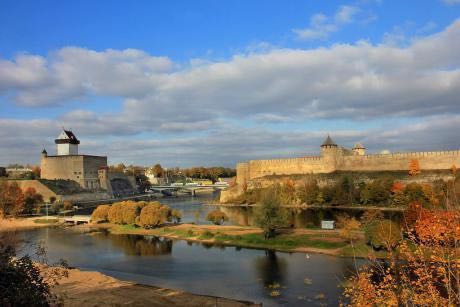 On the left bank of the river Narva the Estonian town of Narva, on the right the Russian town of Ivangorod
On the left bank of the river Narva the Estonian town of Narva, on the right the Russian town of Ivangorod
by Kadri Liik
'My only explanation of the Baltic position is to assume that the disintegration of the Soviet Union is not yet finished: twenty-eight years after the big bang, you still keep flying in the other direction,' noted one high-ranking Russian diplomat in a private conversation in the days before the pandemic, when people could still meet and talk. 'Once you stop and come to a standstill, maybe then we can talk. Until then, it is impossible.'
By Russian standards, this was a fairly empathic interpretation of the Baltic position. More commonly, pundits in Moscow simply attribute the Baltic states’ stance on Russia to the political opportunism of the Baltic elites: they explain away criticism of Russia as attention-seeking in Washington and Brussels, or as a means of mobilizing the electorate at home by using Russia as a 'negative other' in national identity-building. Washington and Brussels, in turn, long ascribed the Baltic states’ wariness of Russia to historical trauma — until, in 2014, they decided that it might have been prescient after all.
In reality, while history, political tactics, and special insights all play a role in forming the Baltic view, none tells the whole story by itself. The Baltic position on Russia has complex roots that are often badly misunderstood both in Russia and the West. At the same time, in the Baltic states themselves, the future and prospects of this positioning are too rarely questioned.
Pundits in Moscow usually simply attribute the Baltic's stance on Russia to political opportunism of its elites
The Roots of Baltic Maximalism
Countries tend to believe in policies that have worked for them. This is why Finland prefers to tone down its rhetoric about Russia: its political establishment is convinced that its low profile preserved the country’s independence during the Cold War. This is also why Germany believes in dialogue: it was engagement between the two halves of the divided country, plus between West Germany and the Soviet Union, that facilitated inter-German contacts and ultimately helped unite Germany.
For the Baltic states, vocal criticism is what worked in the past. The Baltic political elites that matured during Gorbachev’s perestroika and glasnost experienced naming and shaming as the first steps toward correcting wrongs. Glasnost, after all, was all about calling a spade a spade a thousand times over; it was about talking until everything was said by everyone, and everyone was tired — but it worked. In the Baltic experience, unlike Russia’s, diagnosis led to lasting change and, in many cases, a complete cure. That lesson still guides people’s thinking and actions. Socially, most Baltic politicians are still children of perestroika: even if they have no memories of it, they have inherited the tradition.
The perestroika experience also injects a drop of bitterness and disappointment, if not quite a sense of betrayal into the Baltic perception of Russia. This is not unlike the bitterness the 1990s Russian liberals felt about the Baltic elites: 'We were good allies in the struggle against Communism, but then you just went away and left us to deal with all that mess', several of them would say or imply in their interviews to Baltic journalists at the time.
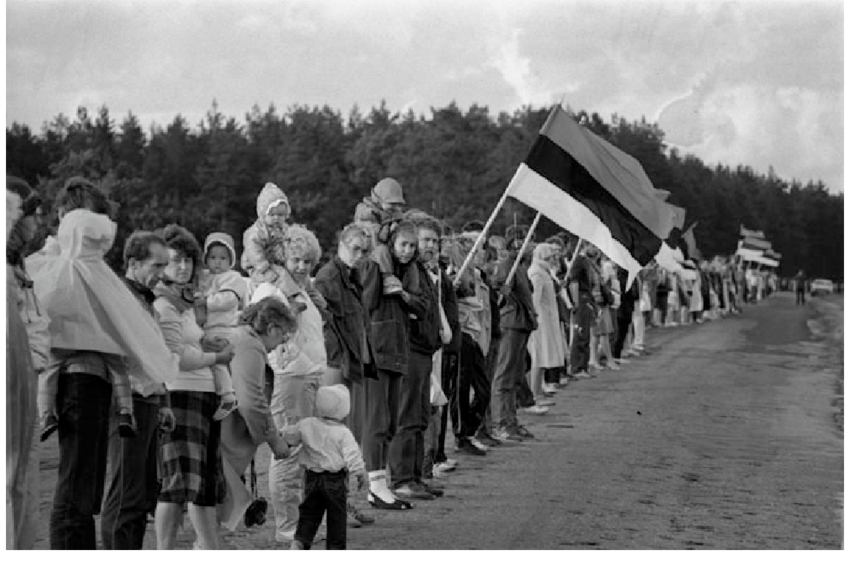 On August 23 1989 a 600 km human chain connected the capitals of the Baltic republics to protest the Soviet occupation (picture National Archives of Estonia)
On August 23 1989 a 600 km human chain connected the capitals of the Baltic republics to protest the Soviet occupation (picture National Archives of Estonia)
The feeling in the Baltic states is that it is Russia that strayed from the path: instead of becoming a democracy, it became a threat to it. It is easy to forget that perestroika and glasnost, and all that movement toward democracy, started in Moscow in 1985 — long before it reached Budapest, Prague, or East Berlin. And it was Moscow that later drastically abandoned it. For the Baltics, this could feel almost the way the fall of Constantinople is felt by the Russian Orthodox — if they thought in such grand categories, which (thankfully) they do not.
For the Baltic states, vocal criticism of Russia is what worked in the past: politicians are still children of perestroika
But this is why the Baltic states tend to communicate their assessment of Russia bluntly, vocally, and at times quite undiplomatically, to Moscow’s irritation: they hope, maybe subconsciously, but with the fanaticism of a true believer, to make Russia return to the path from which it has strayed. And in doing so, they use the most effective means known to them: harsh, sarcastic criticism of the finest perestroika vintage.
It might also be relevant to mention here that for the Baltics, democracy has been important not only and not mainly as a condition for joining Western institutions. Instead, the Baltic experience links democracy to statehood and security. Rightly or wrongly, there is a perception — though chiefly among the intelligentsia — that the imperfect democracy before World War II led to insufficient public discussion about the choices those countries faced in 1939 and 1940, and as a result, to loss of statehood. Hence, democracy became seen as an essential attribute of securing independence.
Western institutions were another such attribute. In the 1990s it was quite striking how, when some Central Europeans aspired to the European Union essentially to help bring about greater well-being, for the Baltic states it was independence and statehood that were the holy grail, for which NATO troops were just a means and EU farm subsidies a by-product.
Over time, this may have changed somewhat: receiving subsidies is quite nice, after all. But even so, this reverse order of priorities is the reason why in the Baltic states one does not find much of the resentment that, according to Ivan Krastev and Stephen Holmes, Central Europe now feels toward the former 'rule-givers' in the West. And this is also why the Baltic states do not buy the arguments often made in Russia: that in order to successfully democratize, countries need to have the incentive of joining Western institutions.
The Nature of Baltic Insights
There is also something to be said about the Baltics’ 'special insights' into Russia’s thinking. A certain popular notion (in the West and in the Baltics) maintains that the Baltic states are prescient experts of Russia simply by virtue of having lived in the Soviet Union. This is, of course, hardly the case. Experience of Soviet realities may be of help in understanding the mentality of some latter-day Russian elites: for instance, President Vladimir Putin, who himself has admitted that, at one time, he 'could be regarded as a successful product of the patriotic upbringing of a Soviet citizen'. But that is as far as it goes.
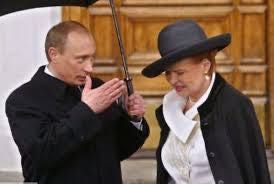 Presidents seldomly meet: in 2005 the Latvian president Vike-Freiberga took part in the Victory Parade in Moscow
Presidents seldomly meet: in 2005 the Latvian president Vike-Freiberga took part in the Victory Parade in Moscow
If the Baltics have indeed had any special insights into Russia’s thinking before the rest of the West caught up — and they may well have — these were rooted not in Soviet history or the Baltics’ supposedly intellectually superior understanding of the country, but in their practical experiences with post-Soviet Russia. For various reasons, the Baltics were exposed to some features of present-day Russian thinking and policymaking earlier than the rest of the West, and that has turned them into whistleblowers about Russia in the Western community: a role they adapted to so well that they continue adhering to it long after it stopped being necessary.
One such experience concerns the now infamous Russian interference. In most of the West, that became an issue in 2016, when Russian activities targeting the U.S. presidential election and the 'Lisa case', a Russian disinformation operation in Germany, served as wake-up calls. The Baltic states, however, had experienced a clumsier and more embryonic form of such activity a decade earlier. In 2005, Moscow set up a new subdivision of the presidential administration: the Directorate for Interregional Relations and Cultural Contacts with Foreign Countries, headed by the media technologist Modest Kolerov.
This was the start of Russian state efforts to influence public discourse outside its borders; the mandate of this institution covered the former Soviet space, including the Baltic states. By now, this institution has closed down, and it is unclear what, if anything, this endeavor achieved for Russia. But it certainly had the effect of making the Baltics suspicious and turning them into early informers of Russian interference.
Another early experience concerns Russia’s interpretation of some basic concepts of international affairs: terms such as sovereignty, legitimacy, interests, and so forth. In 2014, Europe suddenly became aware that Western, particularly European, definitions of these concepts were quite different from Russia’s, meaning that Europe’s differences with Russia ran deeper than the simple divergence of interests or disagreements in analytical judgement: they were rooted in entirely different views of what is desirable, what drives a country’s foreign policy, what should drive it, and what constitutes 'legitimate' freedom of action for countries big and small.
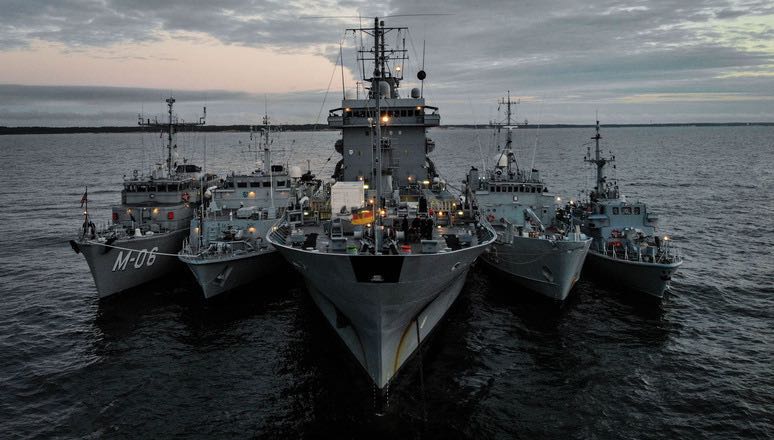 Baltic ships take part in yearly military exercises BALTOPS in June 2020 (picture NATO)
Baltic ships take part in yearly military exercises BALTOPS in June 2020 (picture NATO)
The Baltics, however, were exposed to these conceptual differences much earlier. In the early 1990s, they had to establish relations with Russia essentially from scratch, with no preexisting arrangements to rely on. By contrast, all former Warsaw Pact countries had long-standing relationships with Moscow that they simply needed to adapt. In that process, fundamental differences in understanding, along the lines described above, were bound to surface in ways that they could never have in Russia’s relations with the West.
To deal with all the open questions, all the loose ends — of which there were many — both sides needed a common conceptual foundation to serve as a framework for a way forward. Soon enough, the Baltic states found that their foundations and frameworks simply did not match Russia’s worldview. As one Estonian diplomat said about the early years of border negotiations with Russia: 'Russia saw the negotiations as a legalization of a secession, which allowed Russia as the ‘mother country’ to impose conditions on the breakaway region. The Estonian side had adopted a diametrically opposite position: we have been independent since 1918 and, in the meantime, you have created a mess here, so please clean it up and do it as quickly as possible!'
The Baltic states found that their frameworks simply did not match Russia’s worldview
Looking Forward
Experience — perceived or real — is a strong guide for political behavior. It takes a significant change of circumstances to start questioning its validity and looking for new approaches. But it could be that Baltic-Russian relations are moving to a point where the inertia of the past thirty-five years will have run its course, allowing the two sides to come to a standstill and talk — as recommended by that Russian diplomat.
Revision of old mental frameworks is currently more evident in Russia, where disappointment and disillusionment with the West have guided thinking and policy for the best part of the past three decades. Now, however, a fascinating debate can be observed among foreign policy intellectuals, who, coming from different intellectual angles, almost universally suggest a change: for Russia to stop focusing on the disappointments of the past and look with clear eyes at the world as it is now. Maybe this intellectual process will eventually also reach Russia’s approach to the Baltics — in ways that are hard to predict, but curious to see.
As for the Baltics, they would also be well advised to stop fighting yesterday’s battles. One concerns the perception of Russia in the EU and the West. Up to 2011, the EU lacked a unanimous analytical assessment of Russia’s trajectory: some hoped that Russia was gradually democratizing, albeit with detours and setbacks, while others, including the Baltic states, saw an authoritarian regime consolidating its power in Moscow. Putin’s return to the presidency — announced in September 2011 — put an end to that debate. European faith in Russia’s democratic journey, which should have culminated, as Germans hoped, in values-based rapprochement and normative convergence, vanished.
Following Moscow’s annexation of Crimea in 2014, a new assessment of Russia as a challenger to the European Union, if not a threat, has become mainstream.
Russian foreign policy intellectuals now universally suggest Russia to stop focusing on the disappointments of the past...
It’s fair to say that up until 2011, the Baltic states were ahead of the debate. Whether by prescience or accident, they turned out to be right about Russia’s nature, and since 2014, they have felt vindicated. But since then, they have also been fighting yesterday’s battle. Their take on Russia all too often remains descriptive and analytical: still fiercely committed to exposing Russia’s wrongs. But this is unnecessary: by now, everyone in the West knows about, and agrees on, Russia. Now, the real question is what to do about it — and the Baltic states could contribute more toward providing answers than they are currently doing.
There is a demand for such answers in the EU. One former EU permanent representative from a Baltic country described his conversation with a colleague from southern Europe: 'He took me aside and said, ‘Look: Europe’s Russia policy is now your policy. This is what you have always wanted. So, tell me, where will it lead us, and how?’ And I did not have a clear answer.'
So, today’s challenge for the Baltic states is to transform their moralist position into a policy that could work, both for them and for the EU as a whole. And to do that, it would be handy to have some real curiosity toward Russia as it is, and some real contacts there, as opposed to just adherence to rigid moral high ground.
...but the Baltic states also have been fighting yesterday's battle...
The Baltics also need to come to terms with the fact that Russia will never return to the path it strayed from at some point in the 1990s: the path of pro-Western democratization as a rule-taker, in the style of Central Europe and the Baltics. That window has closed. Russia can still democratize, but the sources and nature of that democracy would be different. It’ll spring not from a desire to emulate the Western model, but from the homegrown realization that to function smoothly, a country needs to have some rule of law, some separation of powers, some legitimacy among the powers that be. Its agents will be found not so much among the liberal intelligentsia as among various professionals who have come to the conclusion that they need some rules to successfully do their work: a growing, though not yet too vocal social group in today’s Russia.
Such a democratic (or maybe semi-democratic) Russia will not be Western-friendly by default: it’ll examine all its relationships in a critical and cold-blooded manner. But it could quite pragmatically cooperate with the West, if and when its interests dictate.
This means that the Baltic crusade to democratize Russia by means of criticism will have to be wound down. Today, the West is not in a position to impose moral norms on Russia. But nor is it likely that the West will stop being a community of values and just disintegrate into nation-states guided by selfish interests, as some in the Kremlin seem to expect.
Russia’s future relationship with the West, the EU, and the Baltic states will inevitably be rooted in a future world order and the values that shape it. Right now, we lack clarity on what those will be. This makes a certain stalemate in Russia-West relations an objective reality. But it can already be said that everyone’s maximalist wishes about the other have been frustrated: neither the West nor the Baltic states have managed to change Russia in the ways they may have wanted, but nor will Russia achieve its maximalist aims, whatever they may be, vis-a-vis the West or the Baltic states.
And herein lies a window for a rapprochement — though modest, and maybe hesitant to begin with. Frustrated maximalism is likely to make everyone more humble and more practical. The Baltic states will be more likely to look at Russia as it is, not as they want it to be. One day Russia might also look at the Baltic states as just neighbors: not as an amputated part of the Soviet Union, or Washington’s hostile lapdog. That could lead to some talking.
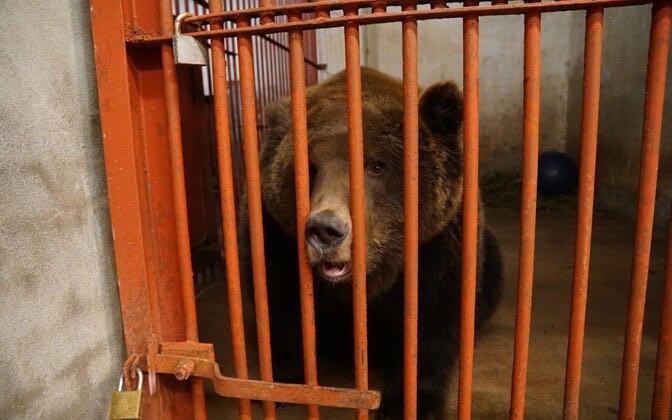 Prosha, the strayed Russian bear was safely returned to Russia (picture Tallinn Zoo)
Prosha, the strayed Russian bear was safely returned to Russia (picture Tallinn Zoo)
The philosophical differences might not be overcome any time soon, but their very existence is conducive to contacts, as differences need to be managed. Should a Russian fighter jet crash over Lithuania, or a NATO one lose a missile over Estonia — both of which have happened — it would be good for the capitals concerned to exchange information directly, as opposed to relying solely on the link between NATO’s Supreme Allied Commander Europe and the Chief of the Russian General Staff. Not to mention more mundane business between neighbors, from the civilized delinking of electricity grids and maintaining transport links to handling COVID-19 and searching for Prosha, the Russian bear who strayed into Estonia and was safely returned home.
With some luck, in the years ahead the relationship between Russia and the Baltic states could move from maximalism to a quiet neighborliness. This is not a glamorous perspective. But it is a good and reliable one, and probably exactly what we need.
